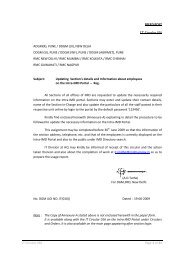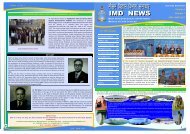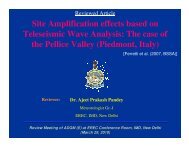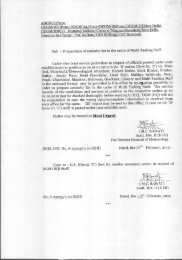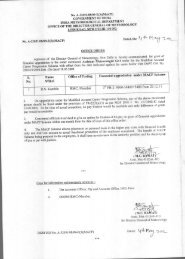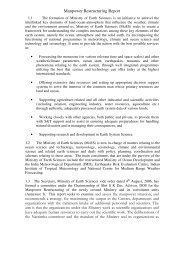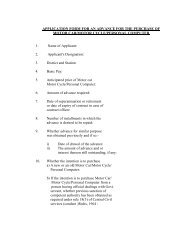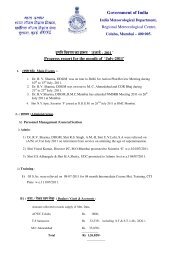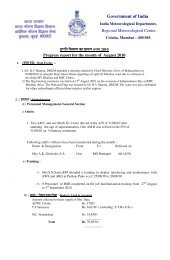1. Introduction - METNET : An e-Governance Intra-IMD Portal - India ...
1. Introduction - METNET : An e-Governance Intra-IMD Portal - India ...
1. Introduction - METNET : An e-Governance Intra-IMD Portal - India ...
Create successful ePaper yourself
Turn your PDF publications into a flip-book with our unique Google optimized e-Paper software.
22. Quarter Allotment Register:<br />
(i)<br />
(ii)<br />
(iii)<br />
(iv)<br />
(v)<br />
Total number of different type of quarters may be recorded in the register.<br />
Allotment of quarter to the official against each type in separate pages may be<br />
maintained with date of occupation and date of surrender<br />
Articles available including fan/electrical points/wash basin/furniture if any in<br />
each type of quarter may be recorded at the top to facilitate in verification at the<br />
time of surrender of quarter<br />
When quarter is vacated, CPWD may be informed to put lock & key or in case by<br />
department, then departmental lock & key may be put<br />
If the quarter is kept vacant for longer duration, CPWD may be asked to remove<br />
fan etc. to avoid stealing<br />
23. Store procurement and stock register:<br />
(i)<br />
Every officer incurring or authorizing expenditure from public money should be<br />
guided by high standards of financial propriety. Every officer should also enforce<br />
financial order and strict economy and see that all relevant financial rules and<br />
regulations are observed, by his own office and by subordinate disbursing officers.<br />
Among the principles on which emphasis is generally laid are the following :-<br />
(a) Every officer is expected to exercise the same vigilance in respect of<br />
expenditure incurred from public moneys as a person of ordinary prudence<br />
would exercise in respect of expenditure of his own money.<br />
(b) The expenditure should not be prima facie more than the occasion demands.<br />
(c) No authority should exercise its powers of sanctioning expenditure to pass an<br />
order which will be directly or indirectly to its own advantage.<br />
(d) Expenditure from public moneys should not be incurred for the benefit of a<br />
particular person or a section of the people, unless –<br />
(i) A claim for the amount could be enforced in a Court of Law, or<br />
(ii) The expenditure is in pursuance of a recognized policy or custom.<br />
(e) The amount of allowances granted to meet expenditure of a particular type<br />
should be so regulated that the allowances are not on the whole a source of<br />
profit to the recipients.<br />
(ii)<br />
(iii)<br />
Expenditure from public funds : No authority may incur any expenditure or enter<br />
into any liability involving expenditure or transfer of moneys for investment or<br />
deposit from Government account unless he same has been sanctioned by a<br />
competent authority.<br />
Delegation of Financial Powers: The financial powers of the Government have<br />
been delegated to various subordinate authorities vide Delegation of Financial<br />
Powers Rules, 1978 as amended from time to time. The financial powers of the<br />
Government, which have not been delegated to a subordinate authority, shall vest<br />
in the Finance Ministry.<br />
13



